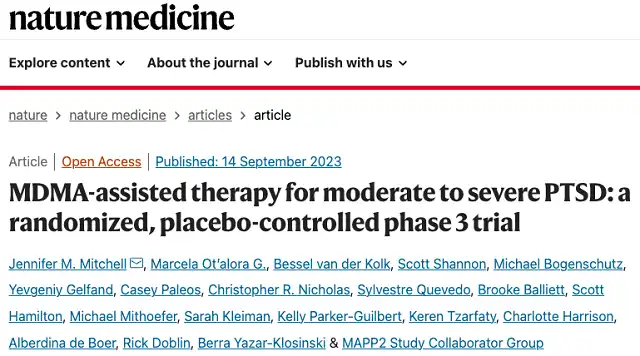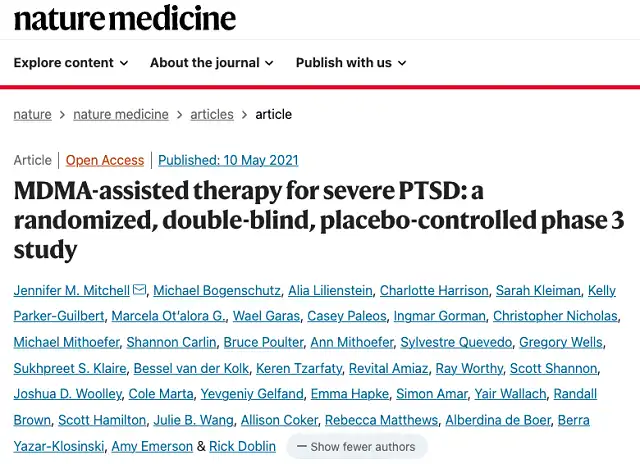Phase 3 Clinical Results of MDMA(Ecstasy)-Assisted Treatment for PTSD Released
- Normal Liver Cells Found to Promote Cancer Metastasis to the Liver
- Nearly 80% Complete Remission: Breakthrough in ADC Anti-Tumor Treatment
- Vaccination Against Common Diseases May Prevent Dementia!
- New Alzheimer’s Disease (AD) Diagnosis and Staging Criteria
- Breakthrough in Alzheimer’s Disease: New Nasal Spray Halts Cognitive Decline by Targeting Toxic Protein
- Can the Tap Water at the Paris Olympics be Drunk Directly?
Phase 3 Clinical Results of MDMA(Ecstasy)-Assisted Treatment for PTSD Released
- Should China be held legally responsible for the US’s $18 trillion COVID losses?
- CT Radiation Exposure Linked to Blood Cancer in Children and Adolescents
- FDA has mandated a top-level black box warning for all marketed CAR-T therapies
- Can people with high blood pressure eat peanuts?
- What is the difference between dopamine and dobutamine?
- How long can the patient live after heart stent surgery?
Making Headlines in Medical Journals: Phase 3 Clinical Results of MDMA(Ecstasy)-Assisted Treatment for PTSD Released, Seeking Approval this Year.
Some individuals continue to suffer from persistent mental disorders even after experiencing or witnessing traumatic events such as accidents, kidnappings, or wars. This phenomenon is aptly described by the saying, “Once bitten by a snake, ten years afraid of a well rope.”
Post-Traumatic Stress Disorder (PTSD) is a mental disorder that occurs when an individual experiences, witnesses, or is threatened with actual death, the threat of death, serious injury, or the threat to their physical integrity. It leads to delayed and persistent psychological distress.
Several factors contribute to the development of PTSD, including family and socio-psychological factors (such as gender, age, marital status, economic conditions, childhood trauma, domestic violence, and exposure to war) and biological factors (such as genetic factors, neuroendocrine factors, and neurobiochemical factors).
Selective serotonin reuptake inhibitors (SSRIs), a class of antidepressant medications, are the first-line treatment approved by the FDA for PTSD. However, nearly half of the patients do not respond to this treatment.
3,4-methylenedioxymethamphetamine (MDMA), commonly known as ecstasy, is a synthetic drug that induces the release of serotonin by binding to the serotonin transporter protein. It has shown promise as a treatment for PTSD in animal and early clinical studies.
On September 14, 2023, researchers from the University of California, San Francisco, and organizations like MAPS published a study titled “MDMA-assisted therapy for moderate to severe PTSD: a randomized, placebo-controlled phase 3 trial” in the prestigious medical journal Nature Medicine.
This multicenter, randomized, double-blind, placebo-controlled phase 3 clinical trial, known as MAPP2, assessed the safety and efficacy of MDMA-assisted treatment for moderate to severe PTSD. It successfully met primary and secondary endpoints, reducing PTSD symptoms and functional impairment in a diverse population with moderate to severe PTSD, with overall good tolerability.

In a previous May 10, 2021 publication in Nature Medicine, the MAPP1 phase 3 clinical trial results also demonstrated good tolerability of MDMA-assisted treatment for PTSD and achieved the trial’s primary and secondary endpoints by reducing the severity of PTSD symptoms and functional impairment.

Due to variations in trauma exposure, gender diversity, and overrepresentation of minorities, including first responders, military personnel, veterans, and abuse survivors who are at disproportionately higher risk for PTSD, these diverse populations have not been adequately represented in previous clinical trials.
In this latest publication, the research team reported the results of the second phase 3 clinical trial, MAPP2, which extended the findings of MAPP1 to a diverse population with moderate to severe PTSD. A total of 104 participants were randomly assigned to the treatment group (53 individuals) and the placebo group (51 individuals), with 26.9% (28/104) experiencing moderate PTSD and 73.1% (76/104) experiencing severe PTSD. The participants were ethnically diverse, with 26.9% (28/104) being Hispanic/Latino, 33.7% (35/104) non-white, and the remaining participants being white.
The results showed that compared to the placebo, MDMA-assisted treatment significantly reduced PTSD symptoms, as measured by the change in the CAPS-5 total severity score from baseline to 18 weeks, with a least squares mean change of -23.7 for the MDMA-assisted treatment group compared to -14.8 for the placebo group. MDMA-assisted treatment also significantly reduced clinician-rated functional impairment, as measured by the change in the M-SDS from baseline to 18 weeks, with a least squares mean change of -3.3 for the MDMA-assisted treatment group compared to -2.1 for the placebo group. Improvements were observed across all domains, including family life, social life, and work life.
Other exploratory results at the end of the study revealed that:
– 86.5% of participants in the MDMA-assisted treatment group experienced clinically significant improvement, defined as a >10-point decrease in CAPS-5 total severity score from baseline to 18 weeks, compared to 69% in the placebo group.
– 71.2% of participants in the MDMA-assisted treatment group no longer met the DSM-5 diagnostic criteria for PTSD, compared to 47.6% in the placebo group.
– 46.2% of participants in the MDMA-assisted treatment group met the criteria for remission, compared to 21.4% in the placebo group.
These data indicate that MDMA-assisted treatment reduces PTSD symptoms and functional impairment in a diverse population with moderate to severe PTSD and is generally well-tolerated.
MAPS, the organization behind this research, stated that with the publication of these two positive phase 3 clinical trials, they will compile all the data and submit a new drug application for MDMA-assisted treatment to the FDA later this year. Given the urgent need for effective treatments for PTSD and the positive results from these two phase 3 clinical trials, MDMA-assisted treatment may become a new option for PTSD patients and their treating physicians if it receives FDA approval.
Links to the papers:
1. https://www.nature.com/articles/s41591-023-02565-4
2. https://www.nature.com/articles/s41591-021-01336-3
Phase 3 Clinical Results of MDMA(Ecstasy)-Assisted Treatment for PTSD Released
(source:internet, reference only)
Disclaimer of medicaltrend.org
Important Note: The information provided is for informational purposes only and should not be considered as medical advice.



